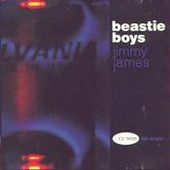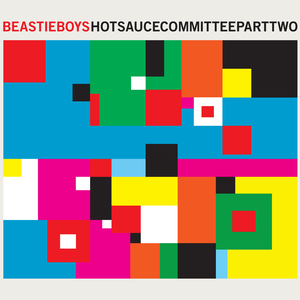
Beastie Boys were an American hip hop/rap rock group from New York City, formed in 1981. The group was composed of Adam "Ad-Rock" Horovitz, Adam "MCA" Yauch, and Michael "Mike D" Diamond. Beastie Boys were formed out of members of experimental hardcore punk band The Young Aborigines, which was formed in 1979, with Diamond on drums, Jeremy Shatan on bass guitar, John Berry on guitar, and Kate Schellenbach later joining on percussion. When Shatan left New York City in the summer of 1981, Yauch replaced him on bass and the resulting band was named Beastie Boys. Berry left shortly thereafter and was replaced by Horovitz.

Michael Louis Diamond, better known as Mike D, is an American rapper, musician, and music producer. He is a founding member of the hip hop group Beastie Boys.

Adam Nathaniel Yauch, also known by the stage name MCA, was an American rapper, bassist, filmmaker and a founding member of the hip hop group Beastie Boys. Besides his musical work, he also directed many of the band's music videos and did much of their promotional photography, often using the pseudonym Nathaniel Hörnblowér for such work.

Adam Keefe Horovitz, popularly known as Ad-Rock, is an American rapper, guitarist, and actor. He was a member of the hip-hop group Beastie Boys. While Beastie Boys were active, Horovitz performed with a side project, BS 2000. After the group disbanded in 2012 following the death of member Adam Yauch, Horovitz has participated in a number of Beastie Boys-related projects, worked as a remixer, producer, and guest musician for other artists, and has acted in a number of films.

"(You Gotta) Fight for Your Right " is a song by American hip hop group the Beastie Boys, released as the fourth single from their debut album Licensed to Ill (1986). One of their best-known songs, it reached No. 7 on the Billboard Hot 100 in the week of March 7, 1987, and was later named one of The Rock and Roll Hall of Fame's 500 Songs that Shaped Rock and Roll. The song was also included on their compilation albums The Sounds of Science in 1999, Solid Gold Hits in 2005 and Beastie Boys Music in 2020.

"Sabotage" is a song by American rap rock group Beastie Boys, released in January 1994 as the first single from their fourth studio album, Ill Communication (1994). The song features traditional rock instrumentation, turntable scratches, heavily distorted bass guitar riffs and lead vocals by Ad-Rock. A moderate commercial success, the song was notable for its video, directed by Spike Jonze; it was also nominated in five categories at the 1994 MTV Music Video Awards.

"No Sleep till Brooklyn" is a song by the New York hip hop group the Beastie Boys, and the sixth single from their debut studio album, Licensed to Ill. One of their signature songs, it describes an exhaustive tour and all the events that make it tiresome, but also emphasizes their determination not to rest until they reach their home base of Brooklyn. "No Sleep till Brooklyn" was a popular concert favorite for the Beastie Boys and traditionally used as their closing song. Among other references to then-popular metal, the title is a play on the Motörhead album No Sleep 'til Hammersmith. The song has been subject to several covers and parodies including "Stutter Rap " by Morris Minor and the Majors.

"Gratitude" is a song by American rap rock group the Beastie Boys, from their third studio album Check Your Head. It was released in October 1992 as the fourth single for the album, primarily serviced to modern rock radio. The live version B-side was recorded in September 1992.

"Intergalactic" is a song by American hip hop group Beastie Boys. "Intergalactic" was released as the first single from their fifth studio album, Hello Nasty, on June 2, 1998. The single reached number 28 on the US Billboard Hot 100, making it the band's third top-40 single, and reached number five on the UK Singles Chart, where it remains the band's biggest hit. It received a Grammy Award for Best Rap Performance by a Duo or Group in 1999.

"Jimmy James" is the first song and third single from American rap rock band the Beastie Boys' third album Check Your Head. The song has been described as a tribute to Jimi Hendrix by Beastie Boys member MCA, and contains samples from several Hendrix songs including "Foxy Lady", "Happy Birthday", and "Still Raining, Still Dreaming". The song also samples the drum beat from "I'm Chief Kamanawanalea " by The Turtles, as well as a line from Mantronix's 1985 single, "Fresh Is the Word".

"Paul Revere" is a song by American hip hop group Beastie Boys, released as the third single from their debut album Licensed to Ill (1986). It was written by Adam Horovitz, Joseph Simmons, Darryl McDaniels, and Rick Rubin. It was produced by Rick Rubin and the Beastie Boys. The song tells a fictional story of how the Beastie Boys met.

"Body Movin'" is a song by American hip hop group Beastie Boys, released as the second single from their fifth studio album Hello Nasty.

The discography of Beastie Boys, an American hip hop group, consists of eight studio albums, four compilation albums, five video albums, seven extended plays, 40 singles and 44 music videos.

"Girls" is a song by American rap rock group the Beastie Boys, released in 1987 with a music video as the seventh and final single from their debut album Licensed to Ill. This song was never performed live and it is one of the few songs on the album that are not in the vein of their standard rap songs.

Kickstarter is an American public benefit corporation based in Brooklyn, New York, that maintains a global crowdfunding platform focused on creativity. The company's stated mission is to "help bring creative projects to life". As of February 2023, Kickstarter has received US$7 billion in pledges from 21.7 million backers to fund 233,626 projects, such as films, music, stage shows, comics, journalism, video games, board games, technology, publishing, and food-related projects.

Hot Sauce Committee Part Two is the eighth and final studio album by American hip hop band Beastie Boys, released on May 3, 2011, through Capitol Records. The project was originally planned to be released in two parts, with Hot Sauce Committee, Pt. 1 originally planned for release in 2009. The release was delayed after band member Adam "MCA" Yauch's cancer diagnosis. After a two-year delay, only one collection of tracks, Part Two, was released and the plan for a two-part album was eventually abandoned after Yauch's death on May 4, 2012.

"Don't Play No Game That I Can't Win" is a song by American rap rock group Beastie Boys, from their eighth studio album Hot Sauce Committee Part Two. Featuring American singer Santigold, the song was released as the fourth and final single from the album on July 26, 2011. "Don't Play No Game That I Can't Win" was written and produced by group members Michael "Mike D" Diamond, Adam "MCA" Yauch and Adam "Ad-Rock" Horovitz, with additional writing by Santigold.

Girls' toys and games are toys and games specifically targeted at girls by the toy industry. They may be traditionally associated either exclusively or primarily with girls by adults and used by girls as an expression of identity. One commentator have argued that the market for girl's toys and games is more challenging than that for boys' toys and games.

Debbie Sterling is an American engineer, businesswoman and the founder and CEO of GoldieBlox. Sterling is an engineer, spokesperson, and advocate for women in engineering and technology. Sterling was named Time's Person of the Moment and Business Insider's 30 Women Who Are Changing the World. GoldieBlox was named one of the World's Most Innovative Companies by Fast Company in 2014. The Toy Industry Association awarded GoldieBlox the 2014 Educational Toy of the Year.
Brett Doar is a multi-disciplinary artist, engineer and contraptionist known for building Rube Goldberg machines and other interactive and kinetic devices. Doar is best known for his roles as a primary engineer for the Rube Goldberg machine in OK Go's "This Too Shall Pass" music video, lead engineer and creative director for "Red Bull Kluge," and creator of GoldieBlox's "Princess Machine". He lives and works in Los Angeles, CA.



















